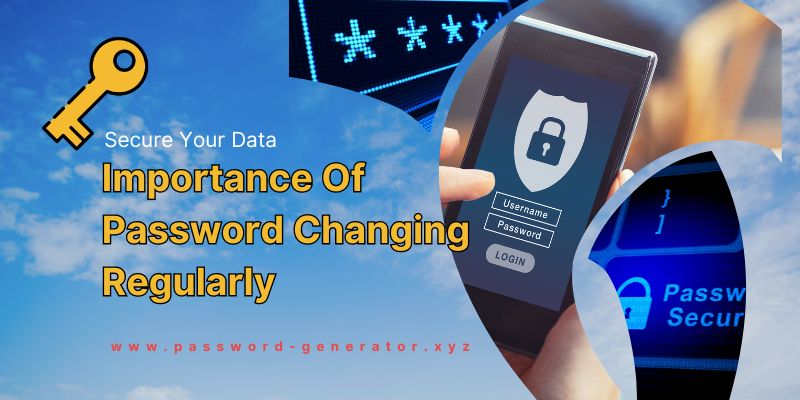Importance Of Password Changing Regularly: Secure Your Data
Importance of Password Changing every few months is to limit hackers' access to your account and minimizes potential damage. Regularly updating passwords ensures that old or saved passwords become useless, protecting your data.

Cybersecurity experts recommend changing passwords every three months to maintain security. By consistently changing passwords, even if someone has discovered an old password, it will no longer be relevant or useful. This practice is especially important after staff changes to prevent ex-employees from accessing sensitive data.
While it may be tempting to stick with the same password or change it infrequently, doing so puts your personal information at risk. Therefore, setting and regularly updating strong passwords is crucial to safeguard your sensitive information from unauthorized access.
Table of Contents
- 1. Importance Of Regularly Changing Passwords
- 2. How Often Should You Change Your Passwords?
- 3. Benefits Of Regularly Updating Passwords
- 4. Rethinking The Need For Mandatory Password Changes
- 5. Stop Changing Your Passwords So Much
- 6. When Should You Change Your Passwords?
- 7. The Importance Of Changing Compromised Passwords
- 8. FAQs Of Importance Of Password Changing
- 9. Conclusion
Importance Of Regularly Changing Passwords

Regularly changing your passwords is crucial in ensuring the security of your accounts. By doing so, you limit the amount of time a hacker can spend in your account, thus minimizing the potential damage a cybercriminal could cause. This practice is recommended by cybersecurity experts, who advise changing your passwords every three months. Additionally, regularly updating your passwords ensures that even if someone discovers an old or saved password, it will no longer be useful, increasing the security of your data.
Changing passwords frequently is especially beneficial in business settings, as it reduces the time available for ex-employees to access sensitive data. However, it is important to note that forcing frequent password changes without reason may do more harm than good.
When changing passwords, it is important to create strong and unique passwords that are not easily guessed or replicated. By adopting proper password hygiene, you can protect your personal information, maintain the security of your accounts, and minimize the risks associated with compromised passwords.
How Often Should You Change Your Passwords?
It is crucial to change your passwords regularly to ensure the security of your online accounts. By changing your password every few months, you limit the amount of time a hacker can spend in your account and minimize potential damage caused by cybercriminals. Regularly updating your passwords means that even if someone finds an old or saved password, it will no longer be useful, and your data will be secure. Cybersecurity experts recommend changing your password every three months.
It's important to act fast and change your password if you suspect hacking or unauthorized access to your account. Consistently changing your passwords will mean that even if someone has found an old password of yours, it will no longer be relevant or useful. However, it is essential to avoid frequently changing your strong and unique passwords unless there is a reason to believe they have been compromised or shared. This can lead to compromised accounts and place your sensitive information at risk.
Remember, it is crucial to create strong, unique passwords and avoid using the same password for multiple accounts. Additionally, never share your passwords with anyone and keep them confidential. By following these practices, you can ensure the security of your online accounts and protect your valuable personal information.
Benefits Of Regularly Updating Passwords

The importance of regularly updating passwords cannot be overstated when it comes to online security. By changing your passwords every few months, you limit the amount of time a hacker can spend in your account, minimizing the potential damage they can cause. Regularly updating your passwords also ensures that any old or saved passwords become outdated and useless, further enhancing your data security.
Cybersecurity experts recommend changing passwords every three months as a best practice. This practice not only protects your accounts from potential breaches but also reduces the window of opportunity for ex-employees to access sensitive data.
While it's important to act fast and change your password if you suspect a hack, consistently changing your passwords even without any specific reason ensures that old passwords remain irrelevant and ineffective.
Remember, creating strong, unique passwords and avoiding the use of the same password for multiple accounts are also essential steps in safeguarding your personal information.
Rethinking The Need For Mandatory Password Changes
Importance of Password Changing
Rethinking the Need for Mandatory Password Changes
Potential harm caused by unnecessary password changes
Changing your password regularly is often seen as a fundamental practice to protect your online accounts. By doing so, you minimize the time a hacker can spend in your account, reducing potential damage caused by cybercriminals. By regularly updating your passwords, even if an old or saved password is discovered, it becomes irrelevant and no longer poses a threat to your data. Cybersecurity experts recommend changing passwords every three months to maintain optimal security.
However, there is an ongoing debate around the necessity of mandatory password changes. Requiring frequent password changes may actually cause more harm than good, especially if there is no reason to believe the password has been compromised. It is important to strike a balance between security and convenience, considering factors such as the likelihood of passwords being reused or written down. Ultimately, individual circumstances and risk assessments should dictate the frequency of password changes.
Why is it important to change your password regularly? Regularly updating your passwords means that even if someone finds an old or saved password, it will no longer be useful, and your data will be secure. How often should you change your online passwords? Cybersecurity experts recommend changing your password every three months. Consistently changing your passwords will mean that even if someone has found an old password of yours, it will no longer be relevant or useful.
On the other hand, there is a debate around the necessity of mandatory password changes. Requiring regular changes may do more harm than good if there is no reason to believe a password has been compromised or shared. Changing passwords too often can lead to weak passwords as people tend to create similar passwords or reuse old ones. This can increase the chances of passwords being exploited by attackers.
Additionally, frequent password changes may result in passwords being written down, which can further compromise security. Balancing security with convenience is crucial when considering the frequency of password changes. It is important to assess individual circumstances and risks to determine the appropriate frequency of password changes.
Stop Changing Your Passwords So Much

Cyber Hygiene And The Misconception Of Frequent Password Changes
Regularly updating your passwords is crucial for maintaining cybersecurity. By changing your password every few months, you limit the amount of time a hacker can spend in your account and minimize potential damage caused by cybercriminals.
Consistently changing your passwords ensures that even if someone finds an old or saved password, it will no longer be useful, thus securing your data. Cybersecurity experts recommend changing your password every three months.
However, it's important to note that requiring frequent password changes may do more harm than good, unless there is reason to believe a password has been compromised or shared. This is because when forced to change a password, users tend to create similar variations, which attackers can exploit.
In conclusion, while it is essential to change your passwords regularly, it's equally important to ensure that the new passwords are strong, unique, and not similar to any previous passwords.
When Should You Change Your Passwords?
Importance of Password Changing
When Should You Change Your Passwords?
Evaluating the need for password changes based on specific circumstances.
Sometimes you might never be aware that your password for an account was compromised. But by changing your password every few months, you limit the amount of time a hacker can spend in your account and hopefully minimize the damage a cybercriminal could cause. Regularly updating your passwords means that even if someone finds an old or saved password, it will no longer be useful, and your data will be secure.
Cybersecurity experts recommend changing your password every three months. Consistently changing your passwords will mean that even if someone has found an old password of yours, it will no longer be relevant or useful. If passwords are regularly changed, particularly after staff changes, this reduces the time available for ex-employees to access sensitive data.
Stop Changing Your (Strong, Unique) Passwords So Much. Good cyber hygiene means creating new, robust passwords every few months, right? Not so... Compromised passwords and username combinations are unsafe because they've been published online. We recommend that you change any compromised passwords as soon as you can. However, changing passwords too often can have its drawbacks.
It increases the likelihood of users choosing weak or easily guessable passwords that they can remember. Plus, if forced to change a password frequently, people may end up using similar variations or reusing previous passwords, which can be exploited by attackers. It's essential to strike a balance between regular password changes and ensuring the creation of strong, unique passwords.
The Importance Of Changing Compromised Passwords

Did you know that changing your passwords regularly can help protect your accounts from being compromised? By changing your passwords every few months, you can limit the amount of time a hacker could spend in your account and potentially minimize the damage they could cause. Cybersecurity experts recommend changing your password every three months to stay secure. Consistently updating your passwords means that even if someone finds an old or saved password, it will no longer be useful, ensuring the security of your data.
Regularly changing your passwords also reduces the risk of ex-employees accessing sensitive data if passwords are updated, especially after staff changes. However, it is essential to avoid common pitfalls when changing passwords. Forcing frequent password changes can lead to weak, predictable passwords, increased chances of using the same password for multiple accounts, and even written down passwords, which could pose additional vulnerabilities. It's important to strike a balance between regular password updates and ensuring password strength and uniqueness.
Another crucial aspect is dealing with compromised passwords. If you suspect that your password or username combination has been published online, it is crucial to change them as soon as possible to protect your accounts. Passwords act as keys to our personal information, and changing compromised passwords ensures that your information remains secure.
FAQs Of Importance Of Password Changing
How Important Is It To Change Compromised Passwords?
It is crucial to change compromised passwords as soon as possible.
To ensure online security, follow these tips: 1. Use strong and unique passwords for all accounts. 2. Enable multi-factor authentication for added protection. 3. Keep track of passwords securely. 4. Regularly check and update security settings. 5. Avoid suspicious websites and links. Compromised passwords can be easily accessed by hackers, putting your personal and sensitive information at risk. By changing your password, you limit the time a hacker can spend in your account and minimize potential damage.
Regularly updating your passwords also ensures that old or saved passwords are no longer useful, enhancing your data security.
Why Changing Passwords Often Is Bad?
Changing passwords often can be bad because it can lead to weaker passwords being created. When forced to change passwords frequently, users tend to choose similar passwords or write them down, making them easier for attackers to exploit. Additionally, regularly changing passwords may not provide added security if there is no reason to believe they have been compromised.
It is more important to focus on creating strong, unique passwords to protect sensitive information from unauthorized access.
Why Is It Important To Set The Correct Password?
Setting the correct password is important to protect your personal and sensitive information from unauthorized access. Hackers use various methods to crack weak passwords, so having a strong and unique password is essential for security. Regularly changing passwords also limits the time a hacker can spend in your account and minimizes potential damage.
How Important Is It To Have Different Passwords?
Having different passwords is extremely important. It helps prevent hackers from accessing multiple accounts if one password is compromised. Regularly changing passwords also limits the time a hacker can spend in an account, minimizing potential damage. Furthermore, using strong and unique passwords enhances overall security and protects personal information from unauthorized access.
So, make sure to have different passwords for each account to maximize security.
Conclusion
Regularly changing your password is crucial for maintaining your online security. By doing so, you limit the time a hacker can spend in your account and minimize potential damage. Updating your passwords regularly also ensures that any old or saved passwords become useless, further protecting your data.
Cybersecurity experts recommend changing your password every three months to stay proactive against potential threats. Remember, your password acts as a key to your personal information, so it's essential to prioritize its strength and uniqueness. Stay vigilant and keep your passwords secure.
